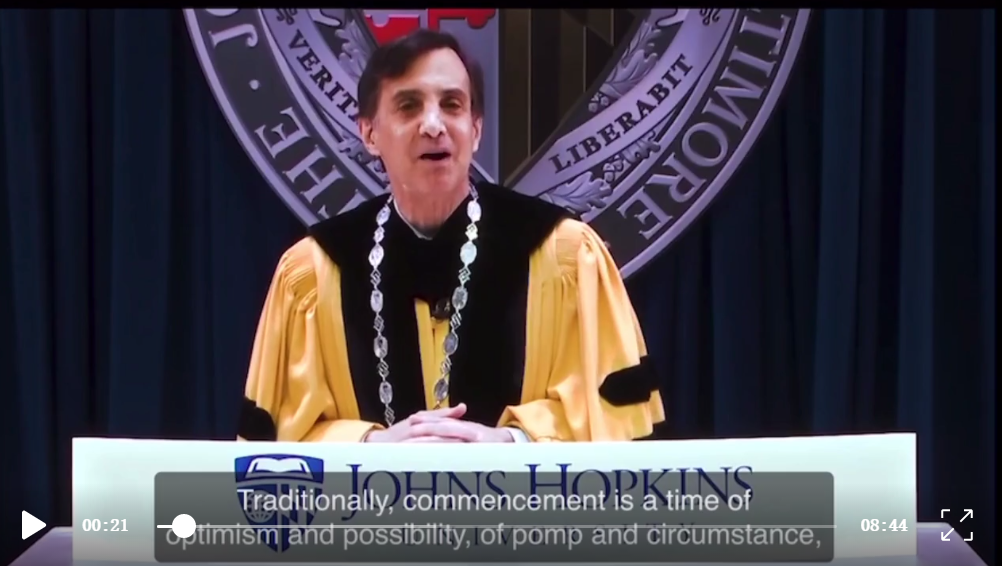约翰霍普金斯大学校长毕业演讲 西西弗斯并非徒劳者,艰难岁月定
校长|罗纳德·丹尼尔斯(Ronald J. Daniels)

尊敬的校友和校董,我们的教职员工们,我们毕业生们的父母、家人和朋友们,以及今天最重要的毕业生们,欢迎大家参加约翰霍普金斯大学2020届毕业典礼!
从好的方面来说,今天的活动不需要你脱下睡衣,甚至不需要你起床。尽管我希望你们中的一些人至少戴上了学位帽。
是的,我一个人在这里(指JHU礼堂),没有人以哈哈大笑回应我刚才的玩笑(其实这些“老爸型玩笑”是给大学校长自己们的)。是的,我估计(别说哈哈大笑了),连个出于礼貌的轻笑都没有吧。
全球病毒大流行不会改变一切,知道这个事实是件好事。不过,让我们面对现实吧:我知道你们是多么期待自己的毕业典礼。
在你喝着咖啡、在BRODY历经四年的辛苦学习和工作后,你希望这一天的到来,是你父母可以入住巴尔的摩Royal Farms Arena酒店,而不是走进你的起居室;是你父母可以看见你和你朋友们在集会上的兴奋,而不是邀请你的父母参加“线上毕业典礼”如同邀请他们参与线上游戏,如此的前所未有。是的,你们可以继续如此想象,我不会责怪你们。
其实最令人失望的是:我们没有像我们所期待的那样,聚在一起。
所以,如果你们只能记住这个毕业典礼发生的一件事,请记住这件事:你的教授们和校长我被迫失去了你们,自从我们(关闭校园)进入线上教学以来,我们就失去了你们。这是一个任何线上见面都无法填补的失望。我们真的很想念你们。
在新冠疫情的当下,这仍然只是我们面临的众多失望之一。今天也是你生命中一个伟大篇章的结束和另一个篇章的开始。你本来的计划是要迎接一个开足马力的经济环境,你本来打算进入具有挑战性的工作、令人羡慕的实习和研究工作机会,或继续攻读令人兴奋的研究生和其他专业学位。然而,短短几个月,现实发生了戏剧性的变化。 我已故的父亲第一次得知自己的生命只剩下几个月的时候,跟我分享了一句犹太格言:“人类一思考,上帝就发笑
人类一规划,上帝就发笑”。
这是生活无常的现实写照。显明人类的脆弱性、在超出我们能力范围下的脆弱性。在当下的局势下,令人倍感深刻。 我不得不承认:当我们在3月份开始线上教学时,我以为我们会很快恢复常态。 人类一规划,上帝就发笑”。 事实上,在这样令人担忧和不确定的当下,我们几乎无法预测事情究竟会如何发展。在我的人生经历中,有一些类似时刻,让我 感到被打击。 我出生在冷战时期,对诸如“确定性互相摧毁”和“核冬天”这样令人毛骨悚然的词汇非常熟悉。 像你们中的许多人一样,我也经历了9/11事件,以及随后令人痛苦的几周、几个月,在滥用描述那一刻所采用的词汇环境下,以为那种流氓式的袭击和随之而来的恐惧,会是一个新常态。 但事实上,我一直觉得我的父母和祖父母这代人比我更了解生活在恐怖和不确定的时代意味着什么。他们目睹了纳粹席卷欧洲,引发了一场旷日持久、毁灭性的全球大灾难,摧毁了现代世界。 新冠疫情大流行不同于历史上的这些时刻,但毫无疑问,我们正面临一场重大的人类悲剧和一场震撼人心的社会冲击,其结局在很大程度上仍是未知的。我们发现自己在问:这是一个离散(单一)的事件,还是我们已经开始生活在一个受其漫长影响的时代? 所以,很多人,也许是你,或者你爱的人,正经历着高度的绝望,而更多的人正生活在一种被迫暂停的状态中,焦急地等待着回归正常。 在这种情况下,作为2020届的毕业生,你们很自然地会把这段时间看作是大学生活和人生下一个篇章之间一段较为漫长的停顿。某种意义上,是一段驿站停留。 尽管当时的生活条件真的很可怕,但那一代人中的许多人不仅活了下来,而且利用这段时间成为了他们应该成为的人。他们所做的决定和采取的行动不仅持久性的塑造了他们,并且成为了他们生命的实质。 我们的古典文学专业的学生都知道,西西弗斯是希腊神话人物,他被罚每天推一块巨石上山,却在日落时让它滚回去。每一天,他都要重新开始。它通常被认为是徒劳无功的终极故事。 在阿尔贝·加缪的解释中,西西弗斯是自己人生命运的主人。他孜孜不倦,他努力为他的生命赋予意义。正如他所写的那样,“攀登高峰的努力足以填满一个人的心。” 阿尔贝·加缪教给我们的是,无论外部环境如何受到约束,无论我们的计划如何被打乱,我们都不能放弃对生命的迫切追求。我们必须做我们认为重要的工作,并对我们认为重要的事项采取行动。努力向高处奋斗。通过这场(生命的)斗争,我们的心中才会充满目标和意义。
透过这样的视角去理解当下,我们已经进入了人生的下一篇章,而非下一篇章的序曲,这是一个令人难以接受的事实。对很多人来说,这可能是他们一生中最艰难的时刻,而且关于这一切将如何结束、何时结束,我们仍处于无所不在的不确定性中,这也放大了这种感受。
但我知道:你已经准备好了。
你们带来了解决问题、创造力、同情心和智能发展的非凡能力。
在过去的三个月里,以及在此之前的所有岁月里,你们在学业上不断努力,你们活出了优雅和坚持不懈的生命,这让足以让西西 弗斯本人都感到高兴。
你们已经开始响应这一时刻的召唤,与千里之外的教授们一起投身于新的研究项目;通过你的客厅与来自世界各地的音乐家们一起演奏激动人心的巴赫音乐;作为未来希望的源泉,你们继续为我们巴尔的摩的社区和你们自己的家庭提供着服务
还有更多的故事。
我知道你们会从这一刻起变得更坚强,更有目标,因为你们肩负起了这一时刻的重任,就像西西弗斯一样,坚强和目标充满了你们的心,知道你们在过去已经尽了自己所能,在当下的每天,每时每刻,你们仍将尽自己所能。
2020届的毕业生们,这是你们的礼物。拥抱它并活出来。朝山上走,向我们显明你们前进的路。
我们为你们感到非常非常骄傲。祝成功!
Hub staff report
/ Published May 22, 2020
Remarks as delivered by Johns Hopkins University President Ronald J. Daniels for delivery at the universitywide Commencement ceremony on May 21, 2020.
To our alumni and trustees, to our faculty and staff, to our parents, family members and friends; and most especially to our graduates, welcome to the Johns Hopkins University Commencement for the great Class of 2020!
Traditionally, Commencement is a time of optimism and possibility, of pomp and circumstance, as you line up by the thousands to take the stage in front of your professors, friends, and family. This year: You got this.
On the plus side, today's event did not require you to get out of your pajamas or even get up at all. Although I hope a few of you at least donned your mortarboards.
While here I am. Alone in Shriver. With no one to laugh at my "president" jokes. (Those are dad jokes, for university presidents.) I'm guessing nary a courtesy chuckle.
It's good to know that a global pandemic doesn't change everything. Still, let's face it: I know how much you were holding out for something different for your Commencement.
The Royal Farms Arena instead of your living room. A culmination of four years spent toiling—and caffeinating—and toiling again in Brody. Partying with your friends rather than relying on your parents to rally for a rousing game of "Virtual Commencement bingo" during these ... unprecedented times. Go ahead, check that box. You're welcome.
The bottom line is: We're not together in the way we hoped to be.
So, please, if you remember just one thing from this day, remember this: Your professors and I are bereft without you, and have been since we went virtual. It is a void that no amount of Zooming can possibly fill. We really miss you.
Of course, this is just one of many disappointments we are all facing in this time of COVID. Today was also supposed to be the closing of one great chapter of your life and the beginning of another, as you prepared to start challenging jobs, coveted internships and research opportunities, or stimulating graduate and professional degrees, in an economy that was firing on all cylinders. Instead, in the space of a few short months, reality has changed dramatically.
There is a Yiddish aphorism that my late father shared with me when he first learned he had just a few months of life ahead of him: "Mann tracht, un Gott lacht."
"Man plans and god laughs."
It is a statement of the wry capriciousness of life. Of our fragility. Of our vulnerability to circumstances beyond our control. And it is a particularly poignant sentiment now.
I have to confess: when we went online in March, it was hard for me to imagine that we wouldn't be back in short order.
"Man plans and god laughs."
Indeed, one can hardly anticipate how exactly things will unfold in fraught and uncertain moments like this one. My lifetime has been punctuated by a few of these moments.
I was born during the Cold War, and was well acquainted with its bone chilling lexicon of terms like "mutually assured destruction" and "nuclear winter."
I also, like so many of you, experienced 9/11 and the harrowing weeks and months immediately following, when it seemed as though rogue attacks and the fear that accompanies them might become—in the overused term of our moment—the new normal.
But, in truth, I have always felt my parents' and grandparents' generations understood far better than I do what it means to live in terrifying and uncertain times. They had watched the Nazis march across Europe, unleashing a protracted and devastating global cataclysm that shattered the modern world.
The COVID pandemic is different from these other moments in history, but there is no doubt that we are confronting a significant human tragedy and a convulsive societal shock whose ending is as yet largely unknown. We find ourselves asking: Will this be a discrete event or is it the beginning of an extended era of our lives?
So, it is not surprising that many people, perhaps you, or those you love, are experiencing high levels of despair, while many more are living in a state of suspended animation, anxiously awaiting a return to normalcy.